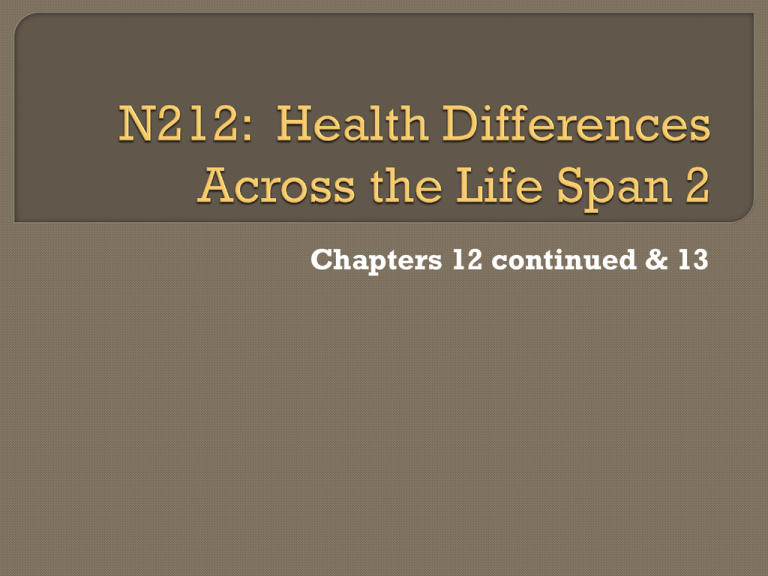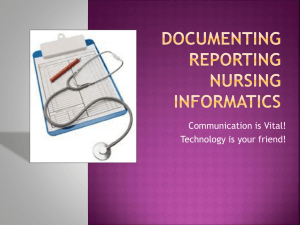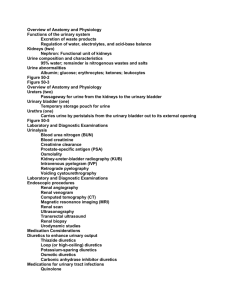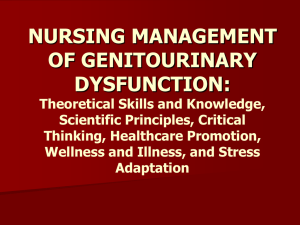N212 chapt 12 and 13
advertisement

Chapters 12 continued & 13 Acute and Chronic Glomerulonephritis • Pathophysiology • Diagnostic findings • Complications • Medical Management • Nursing Management Causes, incidence, and Symptoms Signs and tests Treatment complications risk factors Acute Renal Failure (ARF) Chronic Renal Failure or End-stage Renal disease (ESRD) • • • • • • • Causes, incidence, and risk factors Symptoms Signs and tests Treatment Exceptions (prognosis) Complications Gerontologic considerations Pharmacologic therapy Nutritional therapy Dialysis Nursing Management Stones in the renal pelvis Stones lodge in the ureter Stones lodge in the bladder Assessment Diagnosis Planning and goals Nursing interventions Expected patient outcomes Causes Most common injuries Surgical injuries Clinical manifestations Diagnoses Medical management Nursing management Nursing management of Cutaneous Urinary Diversions Nursing Management of Continent Urinary Diversions Nephrosclerosis Hydronephrosis Urethritis • Causes, incidence, and risk factors • Symptoms In men In women • Signs and tests • treatment Renal Abscess • Pathophysiology • Clinical manifestations • Management Urethral Strictures • Pathophysiology • Clinical manifestations • Management Renal Cysts • Pathophysiology • Clinical manifestations • Management Interstitial Cystitis • Pathophysiology • Clinical manifestations • Management Nephrotic Syndrome • Family issues • Nursing interventions Wilms’ Tumor (Nephroblastoma) Nursing interventions following kidney biopsy Urinary diversions Kidney surgery • Preoperative considerations Kidney Transplant • Postoperative Management Immunosuppressive therapy • Postoperative Nursing Management Assess the patient for transplant rejection Prevent infection Monitor urinary function Address psychological concerns Monitor and manage potential complications Promote home and community-based care Understand nursing care for urinary and renal disorders. Learn symptoms of body fluid disturbances in patients with renal disease. Gain knowledge of nursing management for the patient with an indwelling urinary catheter. Describe a neurogenic bladder. Learn the goals of management for patients with glomerulonephritis and chronic renal failure. Describe the roles of the nurse: practitioner, leadership, and research. Acquire knowledge about clinical pathways and care mapping. Learn about TQI/CQI. Understand the nursing care of patients with metabolic and endocrine disorders. Gain knowledge about patient education regarding macro and micro complications of diabetes. Understand the concerns of the hospitalized diabetic. Describe pharmacological treatment for Type 1 and Type 2 diabetes. Learn the goals of management for patients with thyroid disorders. Nursing care for urinary and renal disorders • Angiography Before the procedure After the procedure • Kidney biopsy • Body fluid disturbances in patients with renal disease • Catheterization and indwelling urinary catheter Complications • Neurogenic bladder Complications Hemodialysis • Expected patient outcomes Peritoneal dialysis Kidney surgery Glomerulonephritis Chronic renal failure Practitioner role Leadership role Research role Community based nursing Clinical pathways and care mapping TQI/CQI Liver biopsy patient • Preprocedure • During procedure • Post procedure Paracentesis • Preprocedure • Procedure • Post procedure Bleeding esophageal • Nonsurgical modalities • Surgical modalities varices Hepatitis A Hepatic Cirrhosis • • • • • Promote rest Improve nutritional status Skin care Reduce risk of injury Monitor and manage potential complications Bleeding and hemorrhage Hepatic encephalopathy Fluid volume excess • Promote home and community-based care Liver Transplantation • Preoperative interventions • Postoperative interventions Cholecystectomy • Postoperative interventions Hypoglycemia • Alternative names • Treatment Patient education regarding Macro & Micro complications of diabetes Concerns of the hospitalized diabetic • Self-care issues • Hyperglycemia during hospitalization Pharmacological treatment for Type 1 & Type 2 diabetes Diabetic Ketoacidosis (DKA) Radioactive Iodine therapy Thyroid Storm Surgical management of the Thyroidectomy patient Medical management of hyperparathyroidism Nursing management of hyperparathyroidism Hypoparathyroidism Pheochromocytoma Corticosteroid therapy Hypophysectomy Diabetes insipidus pancreatitis Kidney Transplant • Assessing the patient for transplant rejection • Preventing infection • Monitoring urinary function • Addressing psychological concerns • Promoting home and community-based care











